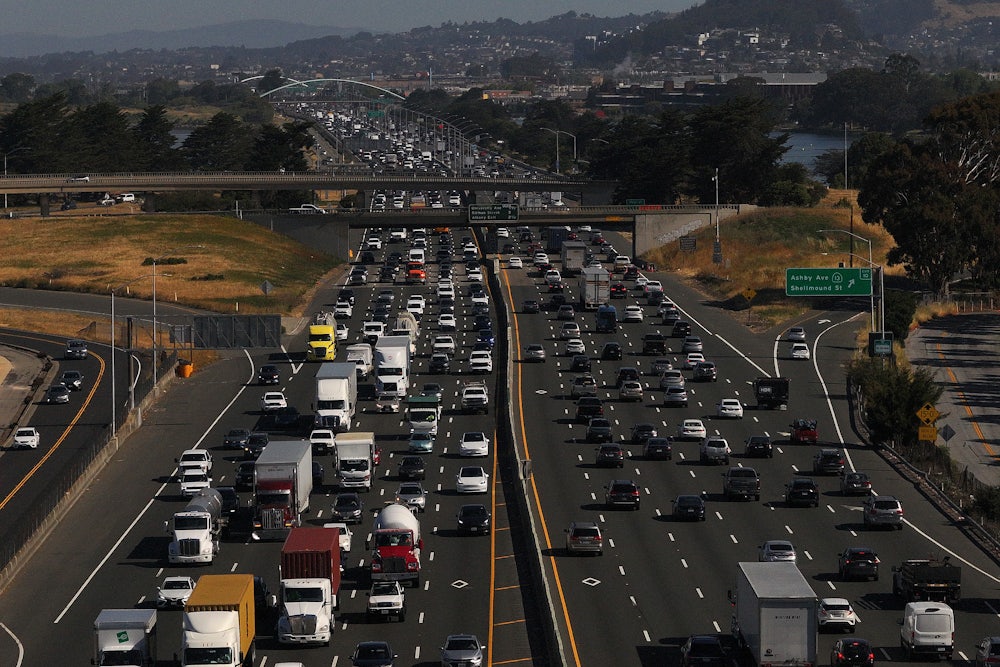The GOP might have just blown up the Senate on behalf of the fossil fuel industry. But that would be oversimplifying things, so bear with me. On Wednesday, the Senate voted on a series of procedural measures to establish that Congress could use the Congressional Review Act, or CRA, to “disapprove” a handful of waivers the Environmental Protection Act had granted to California last year, waivers that allow the state to set its own vehicle emission standards. Never mind that the Senate parliamentarian and Government Accountability Office had both said that Senate Republicans could do no such thing with the CRA. On Thursday, the Senate accordingly voted to rescind those waivers.
Even for those who closely follow federal environmental regulations, this week’s Senate mishegoss is a bit confusing. What is clear is that Republicans’ decision to steamroll over ordinary procedure could have sweeping consequences for California, the U.S. auto industry, and the Senate itself. In the coming years, it might also cost the party dearly.
Here’s an abbreviated overview of how Thursday’s vote happened. The federal government has, over several decades, granted California more than 100 waivers to set its own motor vehicle emissions standards. That’s because, when the government began drafting national vehicle emissions standards in 1967, California had already established its own benchmarks. While the Clean Air Act generally preempts states from setting their own rules for vehicle emissions, Congress concluded at the time that California had “demonstrated compelling and extraordinary circumstances sufficiently different from the Nation as a whole” that justified more stringent rules.
That’s not because California in the 1960s was particularly environmentalist—after all, that very same decade, it made Ronald Reagan its governor. Rather, it’s because its air quality was particularly bad. To this day, California’s heavy dependence on cars and its sizable industry make it smoggy; parts of the state have some of the country’s worst air quality. The transportation sector there—including commercial trucks and passenger vehicles—is responsible for 80 percent of smog-forming nitrous oxide pollution and 50 percent of its greenhouse gas emissions.
Owing to the Golden State’s particular situation, the Clean Air Act established a process by which the state can request exemptions (“waivers”) from the EPA. Amendments to the Clean Air Act in 1990 permitted other states to adopt California’s vehicle emissions rules, as well. Those have generally been approved by Republican and Democratic administrations alike, albeit with some protests along the way. George W. Bush’s administration, for instance, rejected California’s request to regulate greenhouse gas emissions from motor vehicles in 2008; the request was then approved the next year by the Obama administration. During Trump’s first term, the EPA went through standard administrative procedures to revoke a previous approval.
The Biden administration approved waivers for California’s Advanced Clean Car II program, the Advanced Clean Trucks rule, and the Omnibus Nox rule, to limit ozone pollution from trucks. These regulations—especially provisions to phase out the sale of new gas-powered cars by 2035—have sparked outrage from the fossil fuel interests that have the ear of Trumpworld, including automakers and oil and gas companies, which donated generously to his campaign. Red-state attorneys general and industry groups sued over California’s clean car rules last year, and the Supreme Court has signaled that it’ll hear their case. The oil industry doesn’t like California’s Clean Air Act powers “because most clean vehicles use less gas, and they want to sell more gas,” explained Dan Becker, the director of the Center for Biological Diversity’s Safe Climate Transport Campaign. “The auto industry doesn’t like it because they don’t want to make clean vehicles. They want to make gas guzzlers.”
In recent weeks, General Motors, which initially supported California’s clean car rules, urged its white-collar employees to contact their senators with scripted talking points about how they “are not aligned with market realities” and “pose a serious threat to our business.” In all, oil and gas companies, automakers, car dealers, and right-wing groups have spent more than $10 million lobbying lawmakers to claw back California’s waivers. The American Fuel & Petrochemical Manufacturers—a trade association for oil refiners, including Chevron and ExxonMobil—has been running a seven-figure campaign along the same lines, featuring targeted ad buys in Michigan, Minnesota, New Mexico, North Carolina, Texas, and Washington.
Those investments have paid off. Rather than going through the standard, somewhat lengthy process to withdraw California’s approvals, as the first Trump administration did, EPA Administrator Lee Zeldin proposed doing so with the Congressional Review Act. Since 1996, the CRA has allowed governments to rescind federal rules put in place during the last six months of the previous administration. So-called CRA disapproval resolutions can be passed through the Senate with a simple majority rather than the 60 votes that are typically required to push bills through that body. They also aren’t subject to judicial review, and prevent “substantially similar” rules from being published in the future. The problem for Republicans is that the waiver approvals in question aren’t themselves rules but rather administrative actions. They also apply specifically to California and whatever states also choose to adopt the rules the EPA approves. The Congressional Review Act explicitly excludes rules of “particular applicability” from its disapprovals process.
From a legal perspective, none of this is controversial. The Government Accountability Office has stated on two separate occasions since 2023 that California’s waivers are not subject to Congressional Review Act disapproval resolutions since they aren’t rules but rather adjudicatory orders. The GAO added that even if the waiver were to satisfy the legal definition of a rule, “it would be considered a rule of particular applicability and, therefore, would still not be subject to CRA’s submission requirement because of CRA’s exclusions.” The Senate parliamentarian—the nonpartisan referee for congressional procedure—came to the same conclusion. None of that stopped House Republicans (and 35 Democrats in that chamber) from voting to advance the disapproval push to the Senate earlier this month.
In deciding to ignore the Senate parliamentarian and rescind California’s waivers with a simple majority vote, Senate Republicans have indeed gone “nuclear,” although they are attempting to dress it up as something else. Senate Majority Leader John Thune argued in January that overriding the parliamentarian’s guidance would be “akin to killing the filibuster.” He’s repeatedly insisted that the fight over California’s waivers from the EPA is just that, and “not about destroying Senate procedure or any other hysterical claim Democrats are making.” Several members of his own caucus, however—including Lisa Murkowski and Susan Collins—were themselves wary of a direct confrontation with the parliamentarian and eroding the filibuster. Thune won them over by setting up a series of complicated procedural votes that would pose the confrontation indirectly instead, putting the question of whether California’s waivers are indeed eligible for disapproval using the CRA in front of the Senate rather than relying on the parliamentarian’s decision.
The fact remains that California’s waivers are not widely applicable rules, and CRA disapproval resolutions are meant only to rescind widely applicable rules—not “adjudicatory orders.” Republicans opted to ignore the GAO and the parliamentarian and seem to have opened the floodgates for what can be accomplished using the Congressional Review Act and, by extension, a filibuster-proof simple majority vote. California, meanwhile, could lose its strongest tools for meeting federal air quality regulations; the 11 other states that have signed onto its rule will revert back to following national standards. California’s inability to meet those could leave it open to sanctions from the EPA, including disruptions to its federal highway funding. “This is a prime example of how procedure and the intricacies of congressional workings can have real impacts on the planet, and it’s devastating,” Becker said. “By not allowing California to protect its people from auto pollution, air in California will get more poisonous and more deadly for kids.”
Freed to call all manner of administrative actions into question, the GOP, Becker said, is likely to “get a bad case of bloodlust and look around to see what else the Heritage Foundation and Project 2025 have put in the index for elimination.” Everything from vaccine and contraceptive approvals to broadcast licenses for media outlets that are critical of Trump could be on the chopping block, as California’s Senator Alex Padilla has argued. Should Democrats take back the government, they’d in turn have an easier time undoing the Trump administration’s actions, such as corporate merger approvals, and accomplishing more of their legislative priorities with a simple majority.
While California Attorney General Rob Bonta and others are likely to fight the disapprovals in court, CRA actions are typically insulated from legal challenges. “There’s a very open question about what happens if you apply it to things the act doesn’t cover,” said Ann Carlson, the Shirley Shapiro professor of environmental law at UCLA, who served as chief counsel and acting administrator of the National Highway Traffic Safety Administration from 2021 to 2024. She reasoned, when we spoke on Wednesday, that lawsuits against this particular usage of the CRA may be able to proceed given the circumstances, but it’s too soon to tell what will happen. “If it’s insulated from judicial review,” Carlson added, “Congress can apply the CRA seemingly to anything: a license renewal, a permit, a court settlement that DOJ enters into. Why not have the Congressional Review Act apply to those, as well?”
These aren’t just far-off theoretical possibilities. Just before the Senate vote, Republicans passed their “one big, beautiful bill” through the House. In addition to gutting Medicaid, repealing large parts of the Inflation Reduction Act, and lowering taxes for the wealthy, that package includes provisions to throw out fuel economy and greenhouse gas emissions standards put in place by the Biden administration and institute a 10-year moratorium on state-level AI regulation. Bills passed through budget reconciliation, however—and by a simple majority—have to relate to raising or spending revenue, or changing the debt limit; those parts don’t. House Republicans, who aren’t subject to those rules, may have included those sections expecting them to be stripped out by the Senate. They still could be, but the Senate has just proved its willingness to bend the rules.
“If you ignore the parliamentarian on this question,” Carlson said of the Senate’s vote on California’s waivers, “you might see reconciliation bills turn into Christmas trees with all sorts of provisions that aren’t related to revenue or the budget.”
Intentionally or not, Republicans and their donors picked a clever vehicle by which to grant themselves—and Democrats—more power under the Congressional Review Act. California’s motor vehicle regulations are a relatively niche topic, even among committed climate wonks. The Congressional Review Act is an obscure law that most people probably don’t realize exists. Whatever small number of Americans pay attention to Congress have probably been tracking budget negotiations. The barrier to entry for understanding the importance of what the Senate just did is exceedingly high. Having successfully stuck it to California, maybe the GOP will now dutifully follow the GAO and the parliamentarian’s guidance on budget reconciliation and not include any sweeping, extraneous language to overturn federal regulations or prevent states from regulating the AI developers that donate generously to them. Maybe they won’t see today’s vote as a permission slip to go hunting for actions they don’t like or find creative ways to sneak more of their legislative goals into measures that only require a simple majority of votes to pass. But they’ve certainly made all of that—and a fundamental transformation of the Senate—seem a lot more likely.






